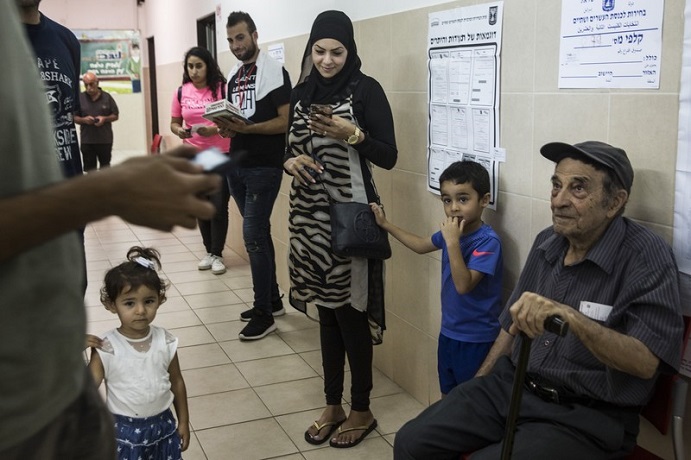
Omar Karmi
The Electronic Intifada / September 18, 2019
With almost all votes counted at the time of writing, Israel is facing another hung parliament.
This could lead to a third election in a year. Or we could see the advent of a grand coalition of three secular parties.
Whether such a government would include Likud’s Benjamin Netanyahu, the incumbent four-time prime minister, is not clear.
For some 6.7 million Jewish Israelis, the possibility that far too many years of Netanyahu rule may come to an ignoble end with charges brought for corruption is significant.
The prospect that extremist religious parties will not be part of the government for the first time in years is also significant.
That is also important, if less so, to 1.6 million Palestinian citizens of Israel, upon whom Netanyahu had poured all his derisory bigotry during an ill-tempered reelection campaign.
But nothing is clear yet. Netanyahu, ever the survivor, may entice Yisrael Beiteinu’s Avigdor Lieberman, ever the opportunist, into another right-wing coalition.
Or Blue-White’s Benny Gantz, the former chief of staff who oversaw Israel’s hi-tech slaughter in Gaza in 2014, might form a coalition without Likud. Or, indeed, without Lieberman.
For now, the balance of probabilities suggests Gantz will lead any new government. But there are plenty of possibilities in the current deadlock and only one certainty: Israel’s typically confused election result will mean practically nothing for some 5 million Palestinians in the occupied West Bank and Gaza Strip who cannot vote but are also ruled by whatever government eventually emerges.
More of the same
Netanyahu had promised to annex large swathes of occupied territory if he formed the next government.
None of the other main parties have made such promises, which might suggest that they would be more amenable to reviving a peace process – long comatose – with the Palestinian Authority.
That, however, is not the case. If Netanyahu had promised to turn off the life support, Gantz and his ilk are merely prepared to keep the power flowing.
The Blue-White alliance is run by three former generals – in addition to Gantz, they are Gabi Ashkenazi and Moshe Yaalon – and a journalist, Yair Lapid.
None of them will make the territorial concessions that any kind of workable two-state solution demands.
None of them will pull a single settler from occupied territory, thereby reversing a war crime the military men among them were instrumental in creating.
And none of them will accept to divide Jerusalem or even walk back on the Golan annexation now that it has US presidential approval.
There will, in other words, be absolutely no change when it comes to the political situation with the Palestinians or the wider region.
All a Blue-White-led government means is that donor countries, who have paid so much to help Israel maintain its occupation for so long, will now find a reason to prolong that charade for a couple more years.
Netanyahu’s promise to annex more territory was of course morally abhorrent. It would have amounted to a naked land grab. But at least it was honest. And it would have left those who claim there is still a possibility for a negotiated two-state solution – that is somehow just to Palestinians, that could somehow result in a viable, free and sovereign Palestinian state – nowhere to hide.
Unfortunately, a Gantz-led government will provide them all a figleaf for a while longer.
A sliver of good news
The biggest story out of the election so far is the success of the Joint List, a coalition of parties led by and catering to Israel’s Palestinian citizens.
Famously fractured, these political parties long failed to stir the passions of a deeply despondent demographic.
Their despondency was a natural consequence of decades of oppression. Palestinians in Israel spent nearly 20 years under military rule before being “allowed” the vote. They are institutionally discriminated against by a state that explicitly excludes them by defining itself as one in which the right to self-determination is restricted to Jews.
They are second-class citizens who are constantly demonized as a fifth column. In this most recent election campaign, Netanyahu called them people who “glorify bloodthirsty terrorists” and “want to destroy us.”
Nevertheless, they are a growing force. And to its credit, the Joint List succeeded not only to unite the vote but galvanize it. Palestinian voter turnout was at 60 percent, up a massive 10 percent from the April vote. That made the Joint List the third-largest political party in Israel.
Delightfully, much of the impetus for the Palestinian turnout seems to have been the very racism meant to intimidate them to stay away.
The Joint List will not be invited – nor would it want to be – into any coalition government. But depending on the makeup of any new government, the Joint List may well have a crucial role to play in parliament, a significant bloc of votes to be courted.
That, at least, is a portent of potential positive change, some counterweight to the outright racism of much of Israel’s polity.
Omar Karmi is an associate editor for The Electronic Intifada and former Jerusalem and Washington, DC, correspondent for The National newspaper





![vrijdag 17 mei in Amsterdam: in gesprek [videoverbinding] met Palestijnse arts Ghassan Abu-Sittah](https://palestina-komitee.nl/wp-content/uploads/2024/04/abu-Sittha-1-1-218x150.png)






